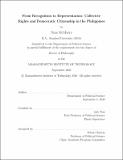From recognition to representation : collective rights and democratic citizenship in the Philippines
Author(s)
McMurry, Nina(Nina Katherine Siegel)
Download1249946636-MIT.pdf (5.755Mb)
Other Contributors
Massachusetts Institute of Technology. Department of Political Science.
Advisor
Lily Tsai.
Terms of use
Metadata
Show full item recordAbstract
How does the recognition of self-determination rights for indigenous and tribal communities affect governance in modern democratic states? Nearly half of UN member states recognize indigenous groups in their constitutions, many devolving control over land and local governance functions. A dominant perspective in political science, rooted in the concept of the nation-state, implies these policies, by empowering nonstate authorities and crystallizing sub-national identities, are likely to have negative unintended consequences. Yet few studies have investigated these predictions directly. This study examines the effects of collective recognition for indigenous communities on state consolidation and democratic representation. Rather than weakening states and undermining democratic accountability, I argue that given underlying conditions of state weakness, collective recognition can encourage the incorporation of marginalized populations by enabling more effective claim-making through formal democratic politics. I evaluate empirical implications of this theory in the Philippines, which has one of the most robust frameworks for indigenous recognition in Southeast Asia. Drawing on more than two years of fieldwork in the country, I combine analysis of administrative data, original survey data and survey experiments, and in-depth qualitative interviews with indigenous leaders and policymakers. I find that recognition through the granting of collective land titles leads to increased indigenous self-identification, but also to greater attachments to national identity and multiple indicators of state integration. In addition, I find evidence that recognition, rather than simply entrenching political elites, increases community electoral mobilization directed toward obtaining public goods from the state. This work not only speaks to contemporary debates surrounding indigenous rights, but also has broader implications for our understandings of post-colonial state consolidation, ethnic and identity politics, and collective participation in democratic systems.
Description
Thesis: Ph. D., Massachusetts Institute of Technology, Department of Political Science, September, 2020 Cataloged from the official PDF version of thesis. Includes bibliographical references (pages 245-257).
Date issued
2020Department
Massachusetts Institute of Technology. Department of Political SciencePublisher
Massachusetts Institute of Technology
Keywords
Political Science.